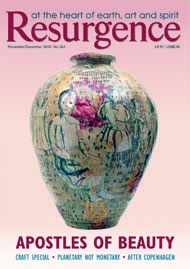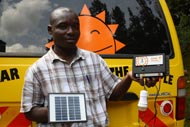Just a few hours out of Nairobi, down a deeply-rutted red dirt track that passes for a main road in the Kitui district of Kenya, the electricity grid - a couple of droopy wires on haphazardly tilted poles - comes to an end. We drive for another hour, take a turning onto what looks like the bed of a dry river, and after a further ten minutes of bumping and heaving arrive at Syomunyu Girls School. Deep in the bush, 35 kilometres from the nearest town, an improbable scene greets us. Two hundred girls in neat uniforms with freshly-pressed white blouses line the benches in a whitewashed school hall. With them, in multicoloured Sunday best, sit dozens of people from the local community. On a platform, the school's principal sits with a row of teachers and local dignitaries. We are here for the official opening of the school's solar electric panels, recently installed by the charity SolarAid. I had been expecting a small group photo, but I was about to get a full-blown African festival.
The local Member of Parliament, Charles Nyamai, opened proceedings. He cannot extend the electricity grid, he explains. To do so would cost a million and a half shillings per kilometre. His entire regional budget would be used up in just a few kilometres. Yet the people should have electricity, he says. Without it, there can be no reading at night, and education – the bedrock of poverty alleviation – will remain in its
current impaired state. The dispensary cannot have chilled medicines: a snakebite victim, as things stand, would be dead before they could reach
town. However, with the solar panels, and the batteries they come supplied with, these problems are now in the past.
Kenyan audiences believe in participation. In unison they emit an
enthusiastic "Yes!" when they agree with a statement, a disappointed "Ah!" when a fact daunts them. The "yes" I hear now sounds heartfelt. This is the beginning of something better, Nyamai continues. ‘A-grades’ have been few, but now – he pauses for emphasis – "I promise
there will be many more." The parents murmur "yes" again. The girls, understandably, laugh rather nervously. One of them is summoned to recite a poem. In perfect English, without script, she weaves a picture of her dream: to read about the world. She hasn't been able to. Now she can. Her dream has come true.
She is joined on the stage by a choir of thirty. They sing breathtaking harmonies in Swahili. John Keane, SolarAid's Swahili speaking field director, tells me they sing of thanks for the lighting of the darkness. Later, the principal explains to me that girls have been using the solar lights to read in shifts: some staying up until midnight, some waking hours before dawn.
Kerosene lanterns are too expensive for mass use, quite apart from the dangers of fume and fire. As for candles, a boarding school like this one burned to the ground recently as a girl seeking her dream of education fell asleep before putting her candle out. Sadly, eleven girls died.
After the speeches and the dancing, we mill around. I shake innumerable hands as SolarAid's Kenyan volunteers show a crowd of parents the solar lighting devices we provide for selected entrepreneurs to sell in their local communities. Solar is not just about lights for schools, medical practices and community centres, the volunteers say, it is about being able to see at home without the penalties of kerosene, if kerosene is even available. It is about people - with a little help and training from SolarAid - being able to make a fair and honest profit with which to alleviate poverty. As we find everywhere in Africa, the message is the easiest sell in the world: use the sun to lift yourselves out of poverty – hence the African brand name SolarAid uses: Sunny Money.
We jump in the land cruiser and rattle off to a nearby school, the second to have solar energy fitted in this district. Here the festival repeats itself with the three hundred pupils from a primary school. The headmaster cleverly turns the event into a prize-giving for his best-performing pupils, with solar lighting devices as the awards. The pupil who scored highest steps forward to claim a solar powered desk lamp. His father, unable to restrain himself, leaps forward from the crowd to join the boy. He has tears in his eyes.








